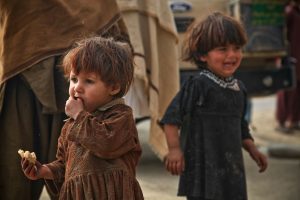Women & War
True peace is not merely the absence of war, it is the presence of justice. - Jane Addams

UN Women
War is not simply a conflict between men and governments. While it is almost always men in power who initiate wars and predominantly men who participate in armed conflict, war has just as much impact on women and children in the region. An opposing force can leave at will, but people who live in the community and “on the ground” have no such option.
When perceiving men as those affected by war, we are overlooking the tremendous toll on women and their children. And it’s women who care for the families during this time, rebuild the communities when the conflict recedes, and serve as the physical, spiritual, and emotional healers in the aftermath.
In spite of the horrendous conditions of war, women often continue to improve their lives and their communities. They pursue education, build their careers and businesses, and care for their children in the midst of the chaos and fear. They work to resolve conflict, modulate radical views, and engage in activism and peace making.
In every war and conflict in history women have been raped, their children killed in front of them, and endured other atrocities. Raping women and girls have historically been a way to demoralize the so-called enemy.
Women pay every bit as big a price as men and yet invariably and more often than not it was the men in power who decided to go to war. And the women are left with destroyed health, homes, lives, and communities.
Except in the 20th Century United States, women are not comfortably sequestered at home while men engage in battle. In most places the war takes place at their own door. Women have planted food; their fields are burned so they face starvation for themselves and their children in addition to physical violence.
 Women’s and children’s bodies become the battlefield. Not just tribal and civil war involve crimes against women; the My Lai massacre in Vietnam was carried out by American troops. As General George S. Patton predicted during World War II, "there would unquestionably be some raping."
Women’s and children’s bodies become the battlefield. Not just tribal and civil war involve crimes against women; the My Lai massacre in Vietnam was carried out by American troops. As General George S. Patton predicted during World War II, "there would unquestionably be some raping."
To create intense intimidation, fear is used as a debilitating force. In 2008, the United Nations declared rape as a weapon of war. A former UN force commander, Major General Patrick Cammaert stated that with rape as part of war, “It has become more dangerous to be a woman than a soldier in an armed conflict.”
In 2018 in Kashmir, India a child was used to intimidate and attempt to force out a nomadic tribe that was grazing their livestock. An eight-year old girl was abducted, drugged, repeatedly raped for several days by several men, and murdered in a Hindu temple. Some of the assailants in the premeditated crime were police officers.
Her family reported her missing the same day that she disappeared but police were not helpful, for the simple reason that they knew where she was, knew what was happening to her, and were participating. The girl was Muslim, and that was enough for Hindus from the perpetrators’ community to defend them. Tribal strife justifies and exonerates the most heinous of crimes.
Men who engage in battle have an opportunity to defend themselves with weapons and other resources. Women in war zones have none of this. Girls and women are inescapably embroiled in a fight they did not initiate but are nonetheless included.
Former President Jimmy Carter posted a video in 2014 that called for an end to the impunity that soldiers enjoy for their war crimes and making prosecution an international priority, regardless of how long it takes. Carter stated, “Soldiers feel this is one of the perquisites of victory – to abuse women and even tiny girls and children – just to prove that they are superior.”
Men in conflict have a history spanning thousands of years, using girls and women as targets and casualties of war. We must never think of conflict and war as between men, but rather as a conflict that men choose to play out with girls’ and women’s bodies as one of the battlegrounds.

UN Women
A Nation is not conquered until the hearts of its women are on the ground. Then it is finished, no matter how brave its warriors or how strong their weapons. – Cheyenne proverb

